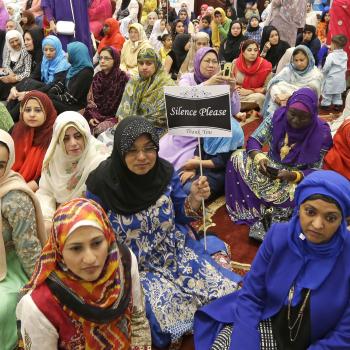By Abdeali Ujjainwalla
I refer to Shireen Hamza’s piece on 5 March 2013, and Aziz Poonawalla’s response on 7 March 2014. As I know neither Shireen nor Aziz, my riposte to both of them is a dispassionate one. I am however a Dawoodi Bohra follower of Syedna Mufaddal Saifuddin Saheb. I would also like to think that I am as intellectual as Aziz with a doctorate in political science, and slightly older than Shireen being in my early 30s. I come from a generation of Dawoodi Bohras who are both at once conservative in their faith, and progressive in their outlook. Inquisitiveness is the sine qua non of this generation. As former US President Ronald Reagan once said to Russian students, “Freedom is the right to question and change the established way of doing things…It is the understanding that allows to recognize shortcomings and seek solutions.”
Response to Shireen Hamza
Shireen is as brave as writing her piece as she is naïve in her motivation. She is courageous to come out of the closet by publicly reaffirming her allegiance to, and pinning her hopes on, Qutbuddin Saheb. But Shireen is also incredibly naïve, because her decision to publish on a public platform appears to have been misguided if the comments below her article is taken as a guide. Thanks to her piece, far more people are now aware of her position in the succession dispute, which, in turn, could cause her greater consternation than it would otherwise have been if she had quietly gone about in adhering to her beliefs, the constant barrage of being castigated by the mainstream notwithstanding. Could it be that she thought it could not get any worse for her so why not just air dirty linen in public? Or perhaps in doing so, she thought she could inspire others to also come out of the closet or cross over to her side? If indeed such was her motivation, she is being self-centred as she is oblivious to the fact that her actions have consequences for the wider Dawoodi Bohra community. As if the media blitz was not enough, we do not need a ‘Shireen Hamza’ to humanise it by pouring her thoughts out on a public platform. She is well within her rights to express herself, but her piece has been more a bane than a boon for us. It beggars belief to think that airing dirty linen in public could endear her to the community.
Focusing on her piece specifically, Shireen starts with a false premise. ‘Schism’ gives the impression that the community is torn right down the middle. Nothing could be further from the truth. It is quite a stretch to argue that there is a schism in the community when a conservative estimate of those who are with Qutbuddin Saheb is only a tiny fraction of the total number of Dawoodi Bohras worldwide. It is more appropriate to describe them as a splinter group or a fringe, and a misguided one from the vantage point of the mainstream. On the issue of social boycott, Shireen is right because she is not the only one. I know of several others who have been marginalised because of the choice they have made in favour of Qutbuddin Saheb. I can understand why social boycotts are being espoused, but I disagree with the approach. I also disagree with calling Qutbuddin Saheb ‘lanat’ (curse on you) just as I take exception to those from the other side casting aspersions on Syedna Mufaddal Saheb. While it is not germane to my riposte in outlining the reasons for adopting such a stance, it is suffice to say that disagreeing with someone does not give you the licence to start yelling ‘lanat’ from the rooftops. I despise hate speech without exception, no matter where it comes from. I also disagree with the actions taken by the enigmatic bureaucratic apparatus of our community (colloquially called Kothar) knocking on the doors of Dawoodi Bohras and compelling them to sign their allegiance to Syedna Mufaddal Saheb on a piece of paper; because if they do not, they will have to face the music. My veneration for the late Syedna Mohammed Burhanuddin Saheb came from the heart and not through a piece of paper. We do not need a 19th century bullying tactic in a 21st century information age.
I end my response with two pieces of friendly advice for Shireen. If she is sufficiently aggrieved with broken friendships because of a choice she made, go and make new friends. Just because your friends have shunned you does not mean you can wash dirty linen in public. Many of us have felt betrayal in the course of our lives, but the more mature ones do not start to moan and groan about it online. This is not some high school drama, because our very identity as a community is at stake. Further, Shireen should be advised to not oversimplify the rights of Bohra women although she may be outraged over the “women-at-call-centres” remark. Assuming for a minute that Syedna Saheb uttered all that Shireen believed he has, it still does not invariably equate to women in our community being somehow marginalized or being prohibited, in Shireen’s words, “from participating in the global economy in a professional capacity.” It could well be that Syedna Saheb is more conservative in his outlook, but I am certain that the community will neither now nor in the future be devoid of highly-skilled professionals simply because of Syedna’s purported views on women working in call centres. I do however agree with Shireen on one issue: while it is obligatory for women to don the rida (Dawoodi Bohra hijab) in public, it should not be imposed on them, not least by men. It should be a freedom of choice, worn, in Shireen’s words, “out of pride in their identity.” In the end however, Shireen has failed to discredit Syedna Mufaddal Saheb while attempting to elevate the status of Qutbuddin Saheb. But while I may question Shireen’s motive for penning this piece, and disclose the lack of intellectual merit in her arguments, she must be applauded for her courage and flair for writing. She is no doubt an asset to Rutgers-New Brunswick.
Response to Aziz Poonawalla
I find Aziz’s riposte to Shireen to be defensive as it is predictable. Perhaps due to a rush of adrenalin mixed with a sudden possible spike in his testosterone levels, Aziz was all guns blazing in his quest to defend Syedna Mufaddal Saheb ostensibly on behalf of the mainstream Dawoodi Bohra community. Let me be upfront about this: Aziz’s riposte does not represent my principles and values. While Aziz has every right, just as Shireen does, to advocate his point of view, he does not have the right to speak on my behalf when he adumbrated at the outset that he seeks to “illustrate why I and hundreds of thousands of other Bohras, men and women and children alike, unhesitatingly call Syedna Saifuddin (tus) our Mawla (lord protector), not out of fear but out of sincere mohabbat (love) and veneration.” I do not dispute the fact that many of us, myself included, consider Syedna Saheb as our Mawla because of love and veneration, but what I contest is the divisive approach taken by Aziz to posit his case. His laundry list of evidences, while attempting to debunk Shireen’s claims, indicates a defensive posture. It also perpetuates an ‘us-versus-them’ or ‘I-am-right-you-are-wrong’ narrative, which has the effect of further dividing instead of healing a community beset by the ongoing succession dispute. Tellingly, Aziz could have chosen not to add to the airing of dirty linen in public, because, as first cousins, Aziz could have been the bigger man by ironing out his differences with Shireen in private. But maybe we should give Aziz a pass because the estrangement between the pair could perhaps be too much of a forbearance. To be sure, there is little difference between Aziz’s response and the comments following Shireen’s piece so to have Aziz issuing his own quick riposte is nothing more than mere regurgitation.
In his quest to defend Syedna Saheb, much of which I agree, Aziz chose however to ignore conveniently one salient issue which Shireen brought up and is a scourge in our community: the lack of transparency and accountability principally in the Kothar. Any Bohra with half a brain knows full well that there is a lobbyist-revolving door in Kothar where money politics predominates. It is just that some of us either choose to ignore it, ignore but grumble in private, or lambast the Kothar openly. Polemics aside, I would be interested to know what Aziz’s views on the Kothar is. How corrupt is the Kothar? Or how transparent and accountable is the Kothar to the general Dawoodi Bohra population? I sincerely hope Aziz does not evade the question by insulting my intelligence with an unintellectual answer like “Mumbai is hardly Kabul.” I am sure Aziz can do better, and I eagerly await his response.
I also find Aziz’s riposte to be overly dismissive of certain claims made by Shireen. Contrary to Aziz’s claims, there was indeed a ‘door-to-door’ collection of signatures in support of Syedna because one such person from the Masjid came to my home to do just that, and he does take note if you decide not to sign on the piece of paper. What does Aziz think would have happened to those who refused to sign? Be offered a bouquet of flowers? Aziz must surely know that their names would find their way to the central database system and get blacklisted. In much the same way, those who were once in the khidmat of Qutbuddin Saheb or were close to him were compelled to make a decision: you are either with us or against us. For Aziz, who is an American, he must know who made this ultimatum, and that was very much a ‘terror’ campaign. Contrary to Aziz’s claims, there were “secret enforcers who roam the seats of Mumbai.” There were several groups of them in and around the vicinity of Raudat Tahera at least in the first few weeks of mourning so as to kick up a fuss should Qutbuddin Saheb choose to come by for ziyarat (visit). I spoke to them in person, and they were very upfront on why they were being deployed. It was possibly the worst-kept secret. Contrary to Aziz’s claims, there have also been “hateful and fear-inducing messages” directed at Qutbuddin Saheb. To say ‘lanat’ on him is a recurring theme in the services at a Masjid I attend quite religiously. So on one hand, we were mourning the demise of Syedna Mohammed Burhanuddin Saheb, while on the other, we were asked to say ‘lanat’ on Qutbuddin Saheb. All said, I do believe, as evidenced in her piece, that Shireen is prone to exaggeration, and perhaps even sensationalism, but for Aziz to say with callousness that the aforementioned events did not take place is nothing short of a prevarication.
The most egregious point made by Aziz is to insinuate that Shireen had sought to proselytise his kids when the opposite was apparently true. To be fair, Aziz has retracted that line but only when he was contacted by Shireen. If an intellectual like Aziz lacked the self-control in making an assertion without verifying the facts, what more an emotionally-charged ordinary Dawoodi Bohra? Aziz is guilty of the very thing he has accused Shireen of doing: being polemical and making false claims. It is unbecoming of any individual, let alone an intellectual one, to be making such a serious charge without verification. If anything, Aziz’s poor judgement here lends credence to Shireen’s claim of there being members in our community who cannot keep their emotions in check, and consequently, become all gung-ho in their actions.
I end my response with a question for Aziz: if Aziz was willing to meet U.S. Congressman Paul Ryan and engage with him in the hope that he would have a more favourable light of Muslims in America, why does Aziz then choose to shun Shireen instead of engaging with her to correct any misconceptions? Why the double standards especially when Shireen is a practising Muslim while Paul Ryan is in cahoots with Islamophobes and has also made the odd anti-Islam and racist remark about African-Americans? Aziz should perhaps reflect on his own riposte by heeding his own advice: “Be. Prepared. Engage. This is how we make a difference. This is the obligation upon all of us.” In short, engage, not isolate.
Moving forward
We are hurting as a community, some members more than others. It also looks rather likely that there could be court proceedings to resolve the succession dispute and its attendant properties et al in the eyes of the law. It is inevitable that there would be more dirty linen aired in public. But as individual followers of Syedna Mohammed Burhanuddin Saheb, let us honour his memory by putting a halt to the to-and-fro polemics especially on a public platform. For my brethren in the mainstream, cease with the boycotts and the hate-filled rhetoric. In fact, why not reach out and engage? Let us not use a sledgehammer to crack a nut. We should be confident in our own identity and culture to withstand any breakaways. For those with Qutbuddin Saheb, do not make it difficult for us to pursue our own beliefs, while you do yours. Each to its own. In the spirit of cautious engagement, I would urge Aziz and Shireen to meet up over a cup of coffee.
I end my riposte with a question for all Dawoodi Bohras to think and ponder: how can we be known as a peace-loving community with the late Syedna Mohammed Burhanuddin Saheb fondly remembered as an Ambassador of Peace when we cannot even be peaceful among ourselves?
Abdeali Ujjainwalla, an Asianist, has a doctorate in political science from University College London. He blogs more in his mind than on the web.













